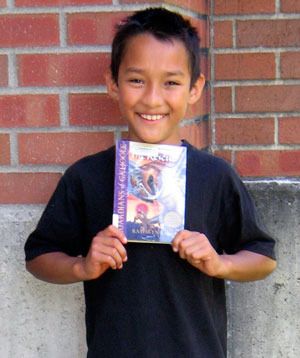MARYSVILLE — The Marysville Library’s summer reading program for this year wrapped up in a grand fashion for 10-year-old Luis Lopez.
Lopez, who went back to school at Cascade Elementary on Sept. 6, received a cookie “the size of his head” and a life-sized poster of him holding his favorite book on Aug. 20 from Kathy Smargiassi, the children’s librarian at the Marysville Library.
Smargiassi explained that Lopez first read 10 books, which automatically won him a free book of his own, then read at least another 10 to enter to win the drawing. Lopez’s favorite books are the “Guardians of Ga’Hoole” series by Kathryn Lasky.
Smargiassi congratulated all the summer reading program participants for doing their part to prevent “the dreaded summer learning loss.”
“Sno-Isle Libraries has a fun summer reading program every year to encourage children to read,” Smargiassi said. “This summer they had a theme of ‘One World, Many Stories,’ because every time you open up a book, you enter a new world.”
Every child who signed up for the summer reading program was issued his or her own “passport” with which to keep track of their reading. Once a child had read 10 books, they were allowed to pick out a book of their own to keep. Those children who continued to read were allowed to place an entry for the Marysville Library’s branch prize for every 10 additional books that they read.
“Yes, Luis read more than 20 books this summer to win his prize,” Smargiassi said. “One girl read more than 200 books. Another girl was going through the summer activities suggested in the passport and wrote a postcard to the librarians saying, ‘I hope everyone in the library, especially the librarians, has an amazingley awesome summer. P.S. I think that’s how you spell amazingley.’”
The Marysville Library’s kid-centric programs, to encourage children to visit them during the summer months, included information on Egyptian mummies and how to play games from around the world, as well as visits from a live llama and a juggling magician. Smargiassi touted the value of these attractions in maintaining the youngsters’ reading levels.
“Contrary to popular opinion, including many educators’, most students, even those ‘at-risk,’ make decent progress in their reading abilities during the school year,” Smargiassi said. “It’s summer when they fall behind. Children who read over the summer either stay the same or get better with their reading ability. Children who don’t read over the summer lose a lot of what they learned during school and have to relearn it again in the fall.”
Smargiassi cited a three-month achievement gap, each year, between the summer readers and the non-summer readers, which she noted adds up a year and a half of lost reading development time between the first and sixth grades.
“Summer reading programs such as the one at the Marysville Library are an efficient, fun way to incorporate reading and reading-related activities into summer family time,” said Smargiassi.



